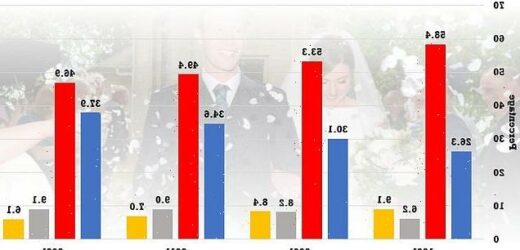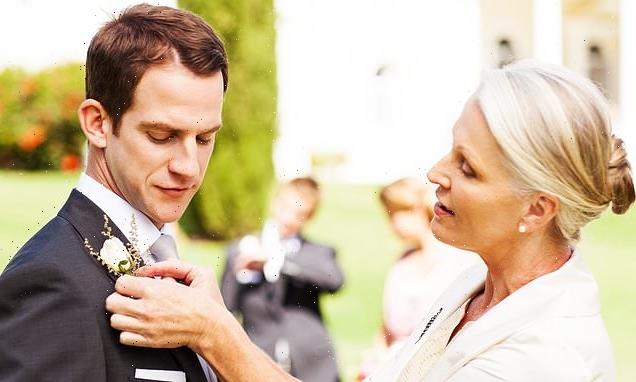The rise of unmarried Britain continues as proportion of adults who have never wed increases from a quarter to almost four in 10 in 30 years – with almost 60% of those aged 30 to 34 now single
Britons are shunning marriage in increasing numbers, according to new figures showing a rise in those who have never, or are yet to, marry at increasingly older ages.
Figures from the Office for National Statistics (ONS) show a continuing trend in people not getting married, with the number of people getting hitched at the lowest rate on record.
Nearly four in 10 adults in England and Wales have never been married or been in a civil partnership, up from three in 10 at the start of the century.
The percentage has risen steadily over recent decades, from 26.3 per cent in 1991 to 30.1 per cent in 2001 and 34.6 per cent in 2011, reaching 37.9 per cent on the day of the latest census in March 2021.
The proportion of adults in a legally registered partnership has fallen over the same period, down from 58.4 per cent in 1991 to 46.9 per cent by 2021.
The census revealed that for the first time a majority of adults aged 30-34 are now unmarried, rising from 49.2 in 2011 to 58.9 per cent in 2021.
Nearly four in 10 adults in England and Wales have never been married or been in a civil partnership, up from three in 10 at the start of the century.
The percentage has risen steadily over recent decades, from 26.3 per cent in 1991 to 30.1 per cent in 2001 and 34.6 per cent in 2011, reaching 37.9 per cent on the day of the latest census in March 2021.
The census revealed that for the first time a majority of adults aged 30-34 are now unmarried, rising from 49.2 in 2011 to 58.9 per cent in 2021.
Same-sex married couples and those in civil partnerships are more likely to be younger, have no religion and have higher-level qualifications than their opposite-sex counterparts, the latest data also shows.
Steve Smallwood, demography topic lead at the ONS, said: ‘When we account for age distribution, we can also see the proportions of adults overall who have never been married or civil partnered was highest among adults reporting ‘no religion’ and within the black and mixed ethnic groups.’
The latest data, published today Wednesday, also shows that the long-term increase in the proportion of adults who are divorced or have had a civil partnership dissolved has almost come to a halt – with similar figures for 2011 (9.0 per cent) and 2021 (9.1 per cent).
There has been a sharp rise in the proportion of young adults in England and Wales who have never been married or in a civil partnership – with more than half of women aged 30-34 in this category and 63.8 per cent of men in the same age group.
The biggest increase is among females aged 25 to 29, up from 67.8 per cent in the 2011 census to 80.5 per cent a decade later.
While 18.3 per cent of women aged 30-34 were unmarried or not civil partnered in 1991, that rose to 43.7 per cent in 2011 and was at 54.2 per cent in 2021.
For men, the biggest increase is among 30-34 year-olds, up 9.1 percentage points from 54.7 per cent in 2011 to 63.8 per cent at the time of the census.
Nearly nine in 10 (88.1 per cent) males aged 25-29 are now unmarried or not civil partnered, up from eight in 10 (80.0 per cent) in 2011 and just over half (54.2 per cent) in 1991.
Earlier this month campaigners claimed a ‘couple penalty’ in Britain’s benefits system provides a ‘huge disincentive’ for partners to move in together or get married.
According to the Marriage Foundation, the way tax credits are calculated on household income sets up a ‘major barrier’ to couples walking down the aisle.
The charity says this is one factor behind what has been identified as a ‘marriage gap’ between richer and poorer households.
A report from the charity highlighted how, for babies born in 2021, 71 per cent of parents in high-earning families were married. For low-earning families, the figure was 34 per cent.
The Marriage Foundation found a ‘marriage gap’ between high and low earners of 37 per cent, which widened to 53 between high earners and the very poorest.
As well as a disincentive in Britain’s benefits system, the charity found a fear of divorce, the cost of weddings, and absence of Government action to promote marriage as possible causes of the ‘marriage gap’.
Source: Read Full Article





